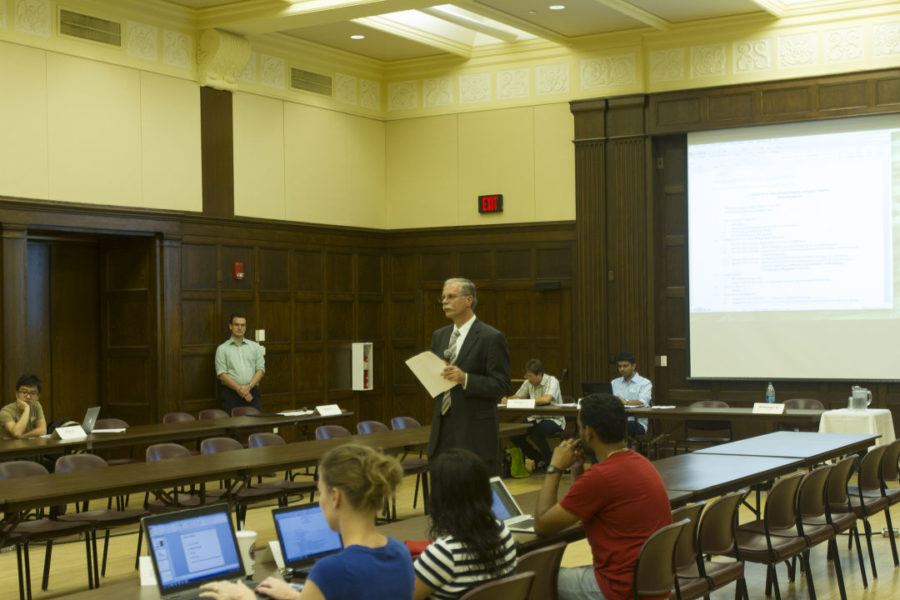GPSS discusses professional funds, proposes new system
Yanhua Huang/ Iowa State Daily
James Davis, Iowa State’s chief information officer, gives a presentation on the upgrades to the cross-campus wireless service during the Graduate and Professional Student Senate meeting Aug. 25.
August 26, 2014
Graduate and professional students put down their textbooks and took a break from research for a few hours Aug. 25 for the first Graduate and Professional Student Senate meeting of the year.
Much of the discussion revolved around a Senate bill that would change the way professional advancement funds are allocated to students, affecting the way graduate students may be able to fund their trips to professional conferences and research opportunities.
Part of student fees, of which each student pays the same amount, goes toward funding trips. In the past, funds would be divided between semesters and the applications for funding a specific student’s trip would be processed on a first-come, first-serve basis. Funds would fizzle out early in the semester, leaving some unserved.
A bill was passed last semester that would change allocation to a monthly budgeting system that would allow funds to be allocated evenly. Applications would be put in a random lottery system for every month, ideally allowing for fair allocation.
Some were concerned that one person may be randomly chosen a few times while some may not be chosen at all. However, senators say there would be a tiered lottery system, allowing those who have never been chosen to be in a separate pool and chosen first.
The monthly lottery system bill would take effect in January. However, a bill proposing a change to the monthly system was discussed.
Senators Mahdi Ramezani and Brian Lois argued against a new monthly budgeting system which would combine the monthly budgeting with the first-come, first-served basis. The new system would be without the possibly unfair lottery system that would make students wait a month to find out if they won the lottery at the end-of-the-month drawing.
The concern was that some graduate students who have conferences during the beginning of the month would benefit more from that system.
The bill will be discussed at length at the September meeting. Senators are encouraged to join the Professional Advancement Grant committee, as well as research Senate Bill F14-03.
Arko Mukherjee, president of GPSS and graduate student in electrical and computer engineering, began the meeting by urging senators to represent their academic departments.
“GPSS is not about senators and execs working separately,” Mukherjee said. “It’s about senators and the execs working together. Everyone in your department should know who you are.”
Mukherjee also proposed adding another executive position centered on organization of the research conference they conduct in April.
“The same amount of money could be distributed around seven positions instead of six,” Mukherjee said about the concern of using more funds to create a new position. “I don’t think any of us are here for the money. I think we are here because we are passionate about GPSS.”
Sen. Atena Darvishi proposed a bill to nominate a graduate student to Government of the Student Body Senate, which bylaws of GSB allow.
Graduate student orientation will take place at the Alumni Orientation Center on Beech Avenue on Sept. 4. There will be a social for graduate students at 5:30 Sept. 5 at Brookside Park.

















